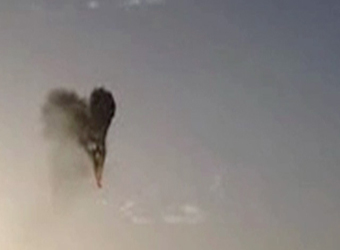A hot-air balloon carrying tourists exploded over the southern Egyptian city of Luxor on Tuesday morning, killing 19 people, the country’s general prosecutor said.
The balloon’s gas supply caught fire as it hovered over sugar-cane fields at dawn, causing an explosion that sent the balloon and its passengers plummeting nearly 1,000 feet, the state news service MENA reported, citing an unnamed security official.
An employee of the balloon operator, Sky Cruise, said the balloon had been in the process of landing but was pushed back into the air by the wind, snapping the gas pipe. Egypt’s civil aviation minister told the al-Jazeera satellite news channel that the cause of the crash remained under investigation.
The dead included tourists from Britain, China, France, Hungary and Japan, a security official said. One British passenger and the balloon’s pilot survived, but they were reported in critical condition.
The accident marks the latest blow to an already crippled tourism industry in Egypt, two years after a popular uprising toppled President Hosni Mubarak.
Egypt’s millennia-old pyramids, ancient temples and dazzling Red Sea beaches historically have drawn millions of tourists each year — 14.7 million in 2010, the year before the uprising. But political instability and deep insecurity on Egypt’s streets since Mubarak’s fall have ravaged the tourism sector, a pillar of the economy.
Tourism revenue in Egypt dropped 30 percent to $8.8 billion in 2011, following the uprising in January and February of that year. Government officials reported a slight resurgence in those numbers in 2012, but many Egyptians working in the tourism sector complain that income remains stagnant amid rising inflation.
Across the country, anger at the newly elected Islamist government and its failure to bring about economic and political stability has fueled a rising tide of violent protests and clashes, which further threaten tourism. Earlier this month, the U.S. State Department issued a travel alert for Egypt.
The balloon accident is the latest in a string of deadly incidents involving tourists. Fatal road and train accidents are common in Egypt because of badly maintained infrastructure and poor law enforcement. French, German and Russian tourists were among those killed in road crashes in the past five months alone.
At the same time, an increase in sexual harassment and assaults on Egypt’s streets has added to the fears of female travelers.
Luxor, the site of the balloon explosion, is home to some of Egypt’s most prized ancient sites, including the Valley of the Kings, where the tombs of pharaohs such as Tutankhamun have been unearthed.
But local residents said security fears in the aftermath of Egypt’s revolution have cut the number of visitors by more than half, and some worried Tuesday that the latest accident would cause the numbers to drop further.
“Before the revolution, we would have been fully booked or overbooked,” said Alaa Eldin al-Sahaby, the manager of Luxor’s Nefertiti Hotel and Aladin Tours, a tour operator that sells hot-air balloon rides and other excursions out of the city. Sahaby said his company used to manage at least two big tour groups on any given day during the high season, in winter. “Now I’m lucky if I happen to get one group every two months,” he said.
Luxor’s governor issued a ban on all hot-air balloon rides in the city after Tuesday’s accident, the state news agency reported.
President Mohamed Morsi’s office released a statement of condolence Tuesday night.
“On behalf of all the Egyptian people, the Egyptian Presidency expresses its deepest condolences and sympathy for the families of those who lost their lives in this tragic incident,” the statement said. Morsi’s office said investigators had been dispatched to the scene to determine the cause of the accident.
Washington Post
